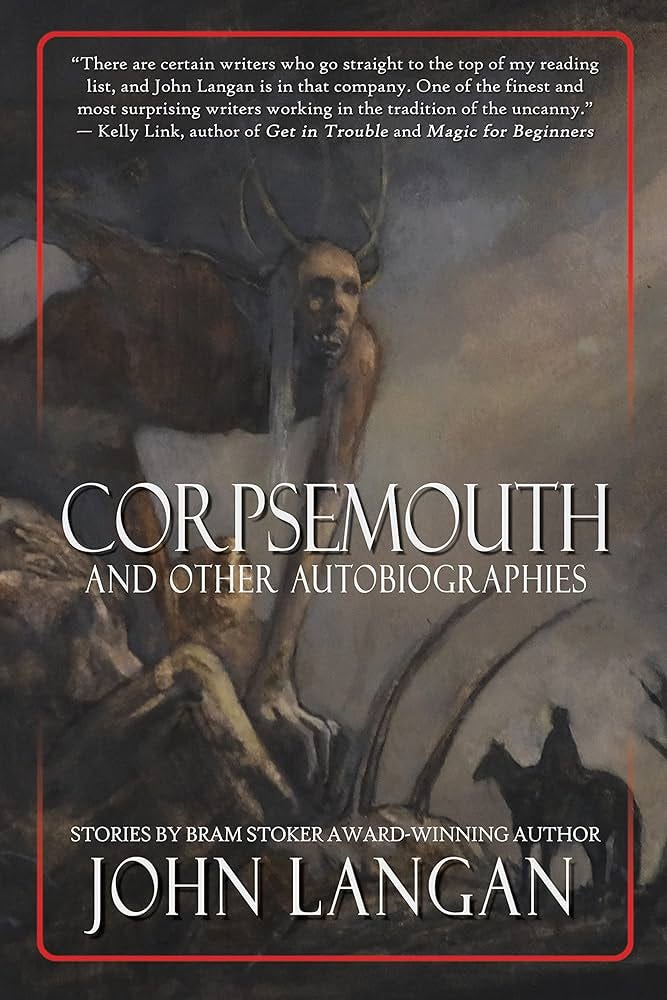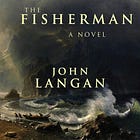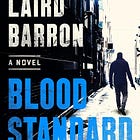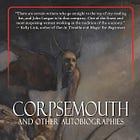Friends of the Barron Read-along 3: Kore by John Langan
Note: As always this writeup will contain spoilers for this story.
There are a lot of stories I could have taken from Corpsemouth to do a look at, but I chose "Kore" because it occupies the same space in my mind that "Tiptoe" does.Both stories are deeply creepy, though the routes they take to get there are quite different.
Some of this is due to Langan's more... Emotional style. To put it simply, Laird writes gritty poet-barbarians. Conan types, noir detectives, and bastards, the lot. While there are exceptions, this is Laird's preferred 'mode.' Langan, on the other hand, prefers relatable academics. His protagonists aren't the kind who "deserve" to be in a horror story. They aren't "bad" people. Instead, he ties the horror to some emotional component. He makes them relatable and empathetic. Then he traumatizes them, putting them in positions where they run up against the uncanny, the strange, the bizarre, the horrific, and the unknown. Of course, by extension, he's also traumatizing us.
Summary
“Kore” begins with the unnamed narrator talking about how he and his wife began a tradition of Halloween walks for their son and his friends after learning how they didn't feel safe trick-or-treating in their neighborhoods.
The first few walks are a rousing success, but before long the family has to move to a smaller home. The home they move into has what the realtor calls a "sauna" but is actually a dry-well that goes deeper than the light of their flashlights can reach. A little concerned about safety, they cover the well and continue about their lives.
A couple of years go by, and they have continued their Halloween walks, which have remained largely successful. A few weeks before Halloween, Alice, the narrator's wife, attends a birthday party with their son. The theme is mythology, and the key feature of the party is a pinata meant to represent Medusa. The children promptly smash the pinata open, but its left intact enough for Alice to bring it home for use around Halloween.
Her intent is to wear the pinata as a mask alongside a different costume from her usual, and pretend to be a 'goddess.'
"Which one?" The narrator asks.
"Who cares?" Alice responds. The Narrator suggests the inclusion of the dry well into the walk then. The children need to offer a piece of candy to the well as an offering to 'the goddess.' Alice agrees.
Initially, all goes well, with even The Narrator's son slightly unnerved by Alice's appearance. However when the time comes for the children to throw a piece of candy into the well as an "offering" he refuses, shaking in his boots all the while.
"Go on, it's just Miss Alice." His mother coos.
"How do you know?" He asks in response, voice quavering.
Wise kid. Alice, doesn't respond, instead letting the question linger in the air, until everyone including the narrator is a little freaked out. The mother hurries her kid out, and the group retreats upstairs. The narrator visits with the boys mother briefly before returning to the party, where he finds Alice has made a remarkably quick wardrobe change.
"You really are something."
"You have no idea." she replies.
The incident lingers at the back of his mind, marinating in his subconscious until the week after Thanksgiving. That night he wakes up and notices that Alice is missing and there is a figure at the end of his bed. It isn't Alice. Panicked he waits until it leaves to grab first a baseball bat, then a knife before clearing his home. Alice is in the basement, naked and alone. He finds her tossing pieces of candy into the dry-well. Wordlessly, he drops the knife and joins her, tossing in a few pieces of his own.
Thematic Analysis
Despite 'Kore"'s relatively short run-time it packs a hell of a wallop. The story is delightfully creepy, able to hold itself up purely on vibes. At first glance though, there really isn't much of a theme here. There are little hints. Family. Masks. "How do you know?" But it doesn’t really coalesce into something. Unless, you know about the title.
There are a couple of meanings for the word 'Kore'. The first is that it's another name for Persephone, the Greek goddess married to Hades. Persephone is a woman of two worlds, a mediator between the world of the living and that of the dead. In the same way, Alice seems to mediate between the thing in the well and the narrator. It is her who finds the Pinata, and who suggests wearing it for the walk after all.
However, I don't completely buy into this read of "Alice as Persephone." It's compelling, and there’s definitely something there, but not enough for it to resolve fully. Thus the second read: a Kore is an offering. A small statue of a clothed woman, offered to either the gods or the dead. This, I think is the meaning of the title. Kore: offerings.
Offerings are a method of placation. A method of worship. What have the narrator’s family awoken? We don't know. It could be a monster, a small god, or some ghost of the past. In the modern era, we have largely left these ideas and concepts behind. In a world of science we don't often find a need to placate an angry spirit. We've outgrown such things. They exist only in remnants, holidays like Halloween and Christmas. Our old gods are shadows of themselves.
The creature that's been awoken is a shadow too. It doesn't hurt anyone. As far as we can tell, it doesn't even try. It's creepy, but there is the real possibility that it isn't actually that dangerous. And what awoke it from it's slumber? Remember, the narrator and his family lived here for two years without incident. It's only once they offer candy that the thing appears. Candy. They give this ancient god, this monster, this ghost, candy. Probably not even the good stuff. Cheap Halloween candy. Our excess.
To my mind, this has to be an intentional choice. Langan could have had his characters offer their son. Or a blood sacrifice. Their neighbors. But instead, they offer candy. To me, this is an scknowledgement of how far we’ve come as a species. We have outgrown this monster. This god-thing.
This context changes "Kore" from something dark and creepy to something creepy and bittersweet. There is something sad here. This creature has faded with the passing of the seasons, withering like the leaves on the trees. To be clear, this interpretation is probably something that exists purely in my own mind. “Kore” ends without clear resolution. We don't know if the creature is satiated and it is entirely possible that this thing will grow more hungry with every passing year, and at some point it may be that candy isn't enough for it. But to me, that ending would remove some the weight from this story. And I can't bring myself to do that.
Don't wake up, you ancient gods
Don't wake up.
Be content in your dreams
We have outgrown you
And that is a bittersweet thing
Links
If you would like to support my work and read “Kore” for youself at my affiliate link below. I’ve also left links to some other John Langan works (In case you were looking at them anyways.)
Corpsemouth and other Autobiographies
The Fisherman
The Wide Carniverous Sky and other Monstrous Geographies








